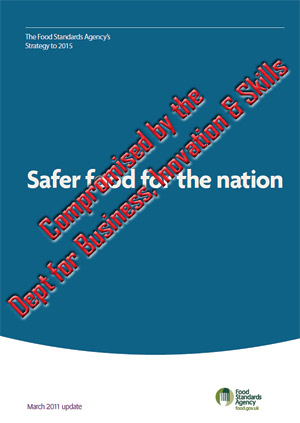Government Takes Risks With Food Safety By Changing FSA Focus From Consumers to Manufacturers
The government has announced that, “small food manufacturers will benefit from more efficient enforcement of regulation and the public will benefit from higher standards of protection thanks to a Government war on ineffective bureaucracy.”
As with Health and Safety pro-active inspection regimes, the government does not believe that prevention is better than an increase in injuries, illnesses, and deaths.
Currently, there are 1.3 million reported cases of foodborne disease in the UK every year, resulting in around 500 deaths.
 The Government’s Focus on Enforcement campaign asked small food manufacturers to report on their experiences of working with national regulators and local authorities.
The Government’s Focus on Enforcement campaign asked small food manufacturers to report on their experiences of working with national regulators and local authorities.
The review was aimed at micro and small food manufacturing businesses employing up to 50 employees. A representative mix of businesses from both high and low-risk food and drink manufacturing sectors took part.
Those eligible for comment included, but were not limited to butchers, bakers, cheese makers and confectioners including those manufacturing ice cream.
Along with comments submitted on the website, 18 businesses and trade associations participated in the review field work which ran for five weeks from 1 May 2012.
The government’s, Department for Business, Innovation & Skills which is implementing cutting health and safety laws, policies and procedures across ALL areas of business activity; has instructed the Food Standards Agency to exempt businesses with a good record of compliance fewer inspections – the same old get out of jail card for free; as now applies to hundreds of employers with regard to their health and safety responsibilities.
The FSA is also instructed to provide “enhanced training for enforcement officers, helping them understand the law and the businesses they are regulating”, and “explore alternate appeals mechanisms in cases of disagreement between the business and the enforcing officer.”
In other words, changing the way in which enforcement personnel apply the rules and regulations in order to allow more leeway to those breaking basic food hygiene and production safety legislation, in order not to effect profits!
But the main aim of course is not protection of the consumer or the workers in the food industry, but to protect and enhance the profits of the businesses concerned.
This can clearly be seen by the instruction that testing of products should be taken away from the manufacturers and replaced with an independent and private laboratory.
The instruction is:
“Ensure guidance for the food industry on food safety management is clear and concise. FSA will continue to review the guidance on control of cross-contamination of E.coli O157, and engage one of the leading food science laboratories and research centres in the UK to test independently the alternative controls to cross-contamination proposed by stakeholders.”
Whilst on the surface this seems a good idea, depending upon the resources of the lab chosen, and the focus on profits, delays and errors in testing food products; may well become the norm, along with associated health risks to the consumer.
The true aim of course is clearly shown by these words of the government’s business department:
“This will ensure any unnecessary burdens on businesses can be removed while strengthening the effectiveness of public health protection.”
But it goes even further, totally changing the FSA’s main remit. Currently the Food Standards Agency’s remit according to their website, is:
“The Food Standards Agency is responsible for food safety and food hygiene across the UK. We work with local authorities to enforce food safety regulations and have staff who work in UK meat plants to check that the requirements of the regulations are being met. We also commission research related to food safety.”
It’s stated ‘core values’ include:
“…. putting the consumer first, openness and independency and being science and evidence-based.”
But following this statement from the Government;
"
Working with industry stakeholders, the FSA will assess what guidance is currently available, whether this is accessible and used by industry, and what the FSA can do to help small manufacturers."
The FSA’s core principle of putting the consumer’s safety first; has now been compromised in favour of food manufactures.
But don’t expect the FSA to admit that. Following the announcement and in the same government press release, Jeff Rooker, Chair of the Food Standards Agency, is quoted as saying:
“Good regulation protects the consumer and underpins business growth by enabling consumers to have confidence in what they eat. The FSA’s mission is to deliver safer food for the nation and these improvements will help with that by enabling us to focus resources where the risk is highest.”
As per usual, the government sees any form of regulation upon business as ‘Red Tape’:
Business and Enterprise Minister Michael Fallon said:
“The Government understands that hard-pressed firms don’t have time for pointless bureaucracy. Smarter enforcement of regulation will spare firms from unnecessary red tape while ensuring that regulators concentrate their efforts where they are most needed to protect consumers and drive up standards.”
Click on the pic to download the FSA Strategy Document (amended 2011)
Source: FSA / Dept Bus Innovation & Skills